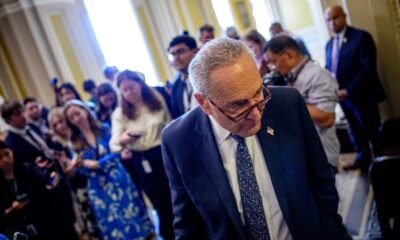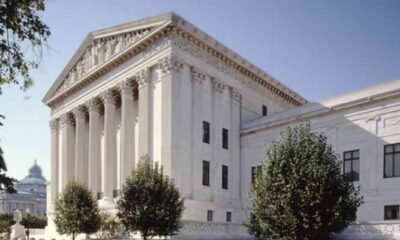Politics
AZ Supreme Court Dismisses Legal Challenge Against Executive Orders

PHOENIX — The Arizona Supreme Court has declined to hear a challenge from the chair of the Arizona Republican Party aimed at nullifying executive orders issued by Governor Katie Hobbs. These orders are intended to facilitate voter registration and enhance voting accessibility, but the court’s decision suggests a reluctance to engage at this stage.
In a ruling delivered Thursday, Chief Justice Ann Scott Timmer emphasized that any legal objections from GOP Chair Gina Swoboda should be addressed in a trial court rather than reaching the state’s highest court directly. Timmer noted the lack of urgency in Swoboda’s case, given that the orders were enacted in November 2023.
“Petitioners have not addressed why neither executive order was challenged until this point in time,” wrote Timmer, highlighting an apparent delay that could have allowed for a faster resolution ahead of the upcoming election.
The court’s order maintains the validity of two pivotal executive orders from Governor Hobbs. One order mandates that state agencies include links on their websites to the Secretary of State’s voter registration site and an online portal managed by the Motor Vehicle Division. It also requires the availability of paper registration forms in visible public areas and stipulates that completed forms must be delivered to the appropriate officials within five days of submission.
Attorney Andrew Gould, representing Swoboda, contended that these measures exceed Hobbs’ constitutional authority. He argued that decisions regarding voting and ballot drop-off locations fall under the Legislature’s purview, which is overseen by Republicans, and that only the county recorder can designate the acceptance and distribution of registration forms.
The second order allows the use of state facilities for polling and ballot drop-off, asserting that such choices remain under the jurisdiction of county officials rather than the governor.
Responding to the challenge, attorney Andrew Gaona defended the governor’s actions, arguing that state law permits state agencies to distribute voter registration forms and that counties have the discretion to determine voting locations.
Gaona highlighted that prior instances, such as using a Motor Vehicle Division office in Avondale as a polling site during the July primary, have already demonstrated this cooperative approach.
The timing of the lawsuit has raised eyebrows, with Gould criticizing Swoboda’s decision to file just months before the election. Gaona described this as an attempt to sow doubt about Arizona’s electoral integrity and handicap voters’ access to the democratic process. “Petitioners should have filed in superior court months ago,” he remarked.
Chief Justice Timmer noted that proper justification for sidestepping standard legal processes was not adequately presented. She reassured that any issues regarding Hobbs’ orders could still be litigated in the future, regardless of their potential impact on the pending election.
Timmer clarified that the court’s refusal to consider the complaint shouldn’t be interpreted as a judgment for or against either party. Although requests for legal fee compensation were dismissed for now, she mentioned such issues could be revisited later.
This legal battle follows previous unsuccessful attempts by Gould to persuade Attorney General Kris Mayes to intervene against Hobbs’ executive actions. Mayes expressed confusion over the rationale that increasing access to voter registration and polling sites could pose harm to Swoboda’s clients and dismissed prior demands for Hobbs to revoke her orders.
Bo Dul, the governor’s general counsel, reiterated the intention behind the executive orders, emphasizing the importance of improving voter access in response to ongoing concerns from certain counties regarding available polling locations.












![Bryan Merritt, 36, was arrested June 26 after allegedly trying to break into his estranged grandfather’s home in Homestead. [PCSO]](https://arizonanews.org/wp-content/uploads/2025/07/Break-In-or-Breakthrough-Man-Arrested-During-Family-Reunion-Gone-Awry-80x80.jpeg)





